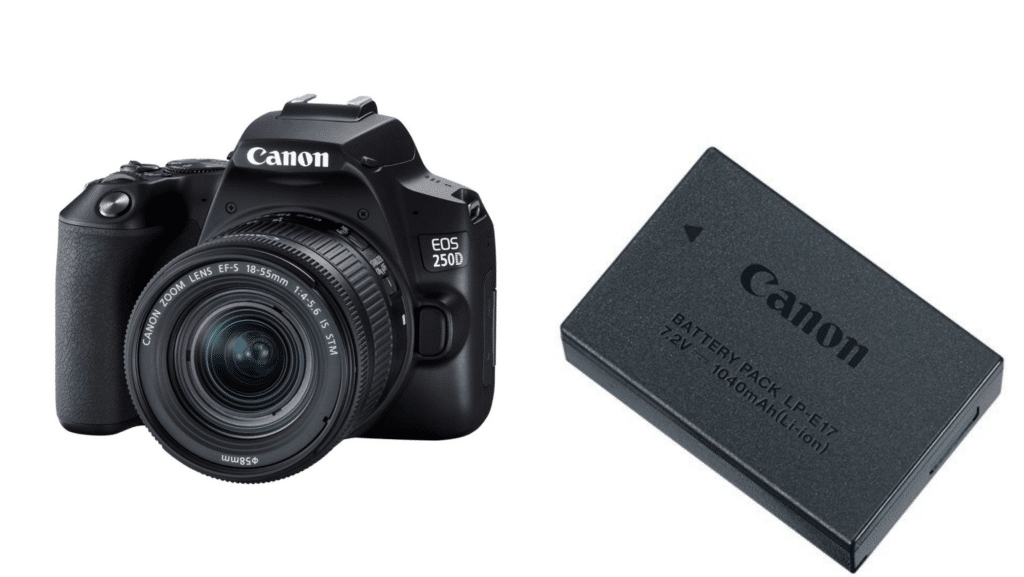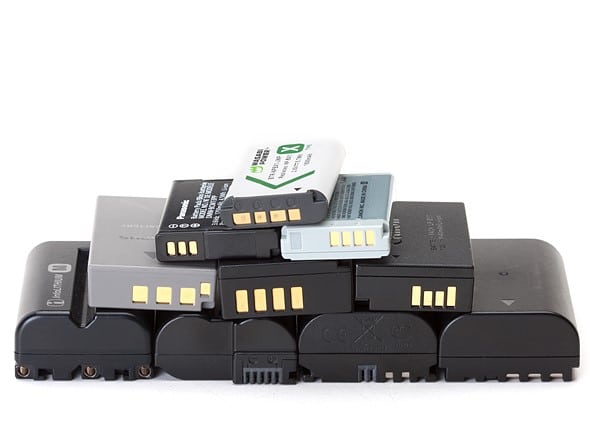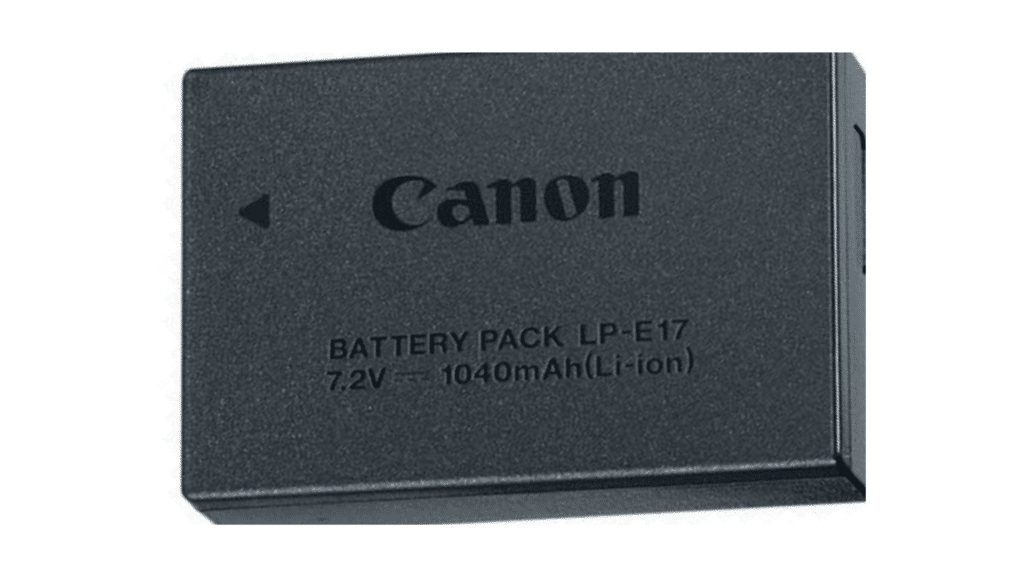In the realm of photography, Canon stands as a titan with a myriad of cameras catering to diverse needs. But a camera, no matter how advanced, is only as good as its power source.
This brings us to an important question that many photography enthusiasts and professionals often ponder – Are Canon camera batteries lithium-powered?
This article delves into the heart of Canon’s power units, exploring their composition, functionality, and the crucial role lithium plays in keeping your camera alive and your photography journey uninterrupted.

Related: Are Laptops Good for Photo Editing?
Understanding Camera Batteries
Camera batteries, the unsung heroes of the photography world, play a vital role in every shot snapped. They are the lifeblood of any camera, supplying the necessary power to all the intricate parts of the camera, from the lens and shutter to the LCD screen and image processing circuits.
Without a fully charged, efficient battery, a camera is little more than an expensive paperweight.
The role of camera batteries extends beyond simply keeping the camera powered. They drive the myriad functions that modern cameras are equipped with.
Everything from autofocus and image stabilization to powering the flash and transferring files to external devices relies heavily on the power supplied by the battery.
Moreover, for Canon users, choosing the right battery type is pivotal to the camera’s performance. Canon cameras, known for their exceptional features and high power consumption, require a battery that can match their demands.
Lithium-powered batteries, known for their high energy density and longevity, are an excellent choice for Canon cameras, ensuring that your camera performs optimally, even during extended photo sessions.
Types of Camera Batteries

There are numerous types of camera batteries available in the market, each with its distinct features, advantages, and disadvantages. Here, we will specifically delve into three primary categories — lithium-ion, nickel-metal hydride (NiMH), and alkaline batteries.
1. Lithium-ion Batteries
Lithium-ion (Li-ion) batteries are the most commonly used power source in modern digital cameras, including many Canon models.
They are renowned for their high energy density, and lack of memory effect, meaning they can be recharged at any level without reducing the overall capacity.
However, they can be relatively expensive and have a tendency to degrade over time, even when not in use.
2. Nickel-Metal Hydride (NiMH) Batteries
NiMH batteries are a popular choice for many photographers due to their affordability and availability. They offer a decent energy density and are more environmentally friendly compared to other battery types.
However, they suffer from a high self-discharge rate, which means they lose power quickly when not in use. Also, they exhibit a memory effect, which can limit their lifespan if not properly managed.
3. Alkaline Batteries
Alkaline batteries are typically used in low-drain devices but can be found in some entry-level cameras. They have the advantage of being cheap, readily available, and easy to replace.
However, their energy density is significantly lower than Lithium-ion and NiMH batteries, making them less optimal for high-power devices like cameras. They also cannot be recharged, which can make them a more expensive option in the long run.
Lithium-ion Batteries
1. In-Depth Explanation of Lithium-Ion Batteries
Lithium-ion (Li-ion) batteries are rechargeable power cells that utilize lithium ions as a primary component of their electrochemistry. During a discharge cycle, lithium atoms in the anode are ionized and separated from their electrons.
The lithium ions move from the anode and pass through the electrolyte until they reach the cathode, where they recombine with their electrons and electrically neutralize.
The movement of these lithium ions creates free electrons in the anode, which creates a charge at the positive current collector. This charge is what is used to power your camera.
2. Advantages of Lithium-Ion Batteries
There are several advantages to using Li-ion batteries. One of the most significant is their high energy density.
In other words, for their size, they can hold a lot of power. Coupled with their lightweight design, they provide a compact yet powerful solution for modern cameras like Canon’s range.
Li-ion batteries also have a low self-discharge rate, which means they retain their charge for a long time when not in use. Furthermore, they do not suffer from the “memory effect” that can reduce the effective capacity of other battery types.
This means you can recharge a Li-ion battery when it’s convenient without having to wait for it to discharge fully.
3. Applications of Lithium-Ion Batteries in Canon Cameras
Lithium-ion batteries are the go-to power source for most Canon cameras.
From their compact PowerShot and IXUS models to the advanced EOS range, Canon relies on Li-ion batteries’ high energy density and durability to deliver consistent performance.
Canon’s range of proprietary Li-ion batteries, such as the LP-E6N and LP-E8, offer extended shooting times and advanced features such as remaining capacity indicators. This allows photographers to capture those important moments without worrying about battery life.
Are Canon Camera Batteries Lithium-Powered?

1. Canon’s Proprietary Battery Technology
Canon has been at the forefront of battery technology, developing proprietary battery systems that are optimized for their range of cameras. Canon’s Li-ion batteries are known for their exceptional output, longevity, and reliability.
They are constructed with innovative technology that provides enhanced communication between the battery and the camera. This results in accurate battery life readouts, preventing unexpected power failures during shoots.
Moreover, these batteries are designed to resist the ‘memory effect’ effects, thereby enabling a longer lifespan.
2. History of Canon Camera Batteries and Compatibility
Canon’s journey in battery technology has been driven by its commitment to innovation and a relentless pursuit of quality.
Initially, Canon cameras were powered by universally available batteries, but the introduction of advanced, power-hungry models necessitated the development of proprietary batteries.
Over time, Canon has refined its battery technology to offer batteries that are not only compatible across a wide range of camera models but also provide extended shooting capabilities.
When choosing a battery for a Canon camera, compatibility is rarely an issue as Canon has maintained a level of consistency across their models.
3. Popular Canon Camera Models and Their Corresponding Battery Types
Canon’s range of cameras is diverse, catering to photographers of all levels. For example, the Canon EOS R and Canon EOS 5D Mark IV, popular among professionals and enthusiasts alike, use the LP-E6N Li-ion battery.
This battery features a high capacity for extended shooting times and incorporates Canon’s intelligent battery technology, providing accurate battery life monitoring.
Similarly, the Canon EOS Rebel T6i and T7i models utilize the LP-E17 Li-ion battery, providing reliable and long-lasting power for these compact DSLR cameras.
In the compact camera range, the Canon PowerShot G5 X and G9 X Mark II rely on the NB-13L Li-ion battery, showcasing Canon’s ability to deliver high-performance batteries for even their smallest cameras.
| Canon Camera Model | Corresponding Battery Type |
| 1. Canon EOS R | LP-E6N |
| 2. Canon EOS 5D Mark IV | LP-E6N |
| 3. Canon EOS Rebel T6i | LP-E17 |
| 4. Canon EOS Rebel T7i | LP-E17 |
| 5. Canon PowerShot G5 X | NB-13L |
| 6. Canon PowerShot G9 X Mark II | NB-13L |
How to Care for Canon Lithium-Ion Batteries
1. Tips and Best Practices for Extending the Lifespan of Canon Lithium-Ion Batteries
Caring for your Canon Lithium-Ion battery can significantly extend its lifespan and keep your camera running optimally. Here are some best practices:
Avoid extreme temperatures: Exposure to high or low temperatures can shorten battery life.
Try to store your camera and the batteries in a cool place and avoid leaving them in direct sunlight or freezing environments.
Use the battery regularly: Lithium-ion batteries perform best when they are used regularly. If you’re not going to use your camera for a while, turn it on every few weeks and take a few pictures.
Avoid complete discharges: Contrary to popular belief, Lithium-Ion batteries do not need to be fully discharged before recharging. In fact, they prefer partial rather than full discharges.
2. Proper Storage, Charging, and Handling Procedures
Proper storage and charging practices can significantly extend the lifespan of your Canon Lithium-Ion batteries:
Store in a cool, dry place: High temperatures can degrade battery performance over time. Don’t leave batteries in a hot car or sunny windowsill.
Use a proper charger: Always use a charger designed for your specific Canon battery. Using a non-Canon charger can lead to poor performance and even damage.
Handle with care: Be careful not to drop your batteries or expose them to physical shock as this can damage the battery cells.
3. Addressing 3 Common Myths about Camera Battery Care.
There are many myths and misconceptions about camera battery care. Here are a few:
Myth#1: “You should fully discharge a lithium-ion battery before recharging it.”
Fact: Lithium-ion batteries prefer partial discharges to full ones, and continuously doing full discharges can actually shorten the battery life.
Myth#2: “Leaving the battery in the camera when not in use will drain it.”
Fact: Modern Canon cameras have a power-saving feature that minimizes battery drain when the camera is not in use.
Myth#3: “Store lithium-ion batteries in the refrigerator to extend their lifespan.”
Fact: While lithium-ion batteries do prefer cooler temperatures, extreme cold can be just as harmful as extreme heat. It’s best to store batteries in a cool, dry place, but there’s no need to refrigerate them.
Conclusion
Canon’s dedication to innovation and quality is clearly evident in their lithium-powered camera batteries. These batteries provide exceptional performance across a wide range of Canon camera models, from professional DSLRs to compact PowerShots.
The longevity and reliability of these batteries, coupled with Canon’s intelligent battery technology, ensure that photographers can capture moments without worrying about unexpected power failures.
Proper care and handling, based on the recommended practices and debunking common battery myths, can further enhance the lifespan of these batteries.
With Canon’s lithium-powered batteries, you can focus on your passion for photography, knowing you’ve got reliable, long-lasting power at your fingertips.